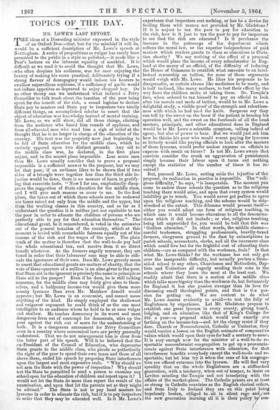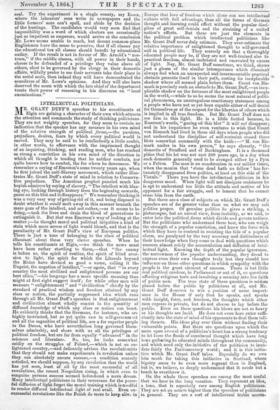TOPICS OF THE DAY.
MR. LOWE'S LAST EFFORT. THE ideas of a Dissenting minister expressed in the style of an Oxford Don—that, but for the mischief it will do, would be a sufficient description of Mr. Lowe's speech at Nottingham. A series of propositions so vulgar has rarely been presented to the public in a style so polished,—it reads like a Peer's lecture on the inherent equality of mankind. It is difficult as we read it to avoid the thought that Mr. Lowe, .who often despises his audience, was for once enjoying the luxury of making his scorn practical, deliberately trying if a strong flavour of demagogney would induce his hearers to swallow supercilious sophisms, if a sufficiency of garlic would not induce appetites so depraved to enjoy chopped hay. On no other theory can we understand what induced a Privy Councillor to talk trash about the taxation of the poor being spent for the benefit of the rich, a sound logician to declare State pay to masters and State pay to inspectors two totally different things, an accomplished scholar to assert that the object of education was knowledge instead of mental training. Mr. Lowe, as we will show, did all those things, eliciting from the audience who heard him rounds of applause, and from all educated men who read him a sigh of relief at the thought that he is no longer in charge of the education of the country. His text was the propriety now just beginning to be felt cf State education for the middle class, which he entirely opposed upon two distinct grounds. Any aid to the middle class was, he declared, in the first place unjust, and in the second place impossible. Less acute men than Mr. Lowe usually consider that to prove a proposal impossible is a sufficient answer to the proposer, but we may let that pass; if an audience likes to be shown that if two sides of a triangle were together less than the third side in- justice would be done, there is no manner of harm in gratify- ing that eccentric taste. " Now I for one, emphatically disap- prove the suggestion of State education for the middle class, and I will give such reasons as occur to me. In the first place, the taxes out of which these schools must be endowed are taxes raised not only from the middle and the upper, but from the working classes in this country, and as tar as I understand the question it is neither just nor equitable to tax the poor in order to educate the children of persons who are perfectly able to pay for that education themselves." The educational grant, be it remembered, is voted in the estimates out of the general taxation of the country, which at this moment is levied with remarkable fairness equally out of the income of the rich and the wages of the poor. The plain truth of the matter is therefore that the well-to-do pay half the whole educational tax, and receive from it no direct benefit whatever. As the farmers angrily murmur, they are taxed in order that their labourers' sons may be able to ridi- cule the ignorance of their own. Does Mr. Lowe gravely mean to assert that educational grants are matters of charity, that the vote of three-quarters of a million is an alms given to the poor, that State aid to the ignorant is precisely the same in principle as State aid to the pauper? Even if he does, he is still talking nonsense, for the middle class may fairly give alms to them- selves, and a halfpenny income-tax would give them more county lyceums than even Mr. Matthew Arnold would approve ; but Mr. Lowe is an economist, and cannot mean anything of the • kind. He simply employed the shallowest and vnlgarest argument he could think of as the one most intelligible to an audience whom he held to be at once vulgar and shallow. He teaches democracy in its worst and most dangerous form out of contempt for democrats, stirs up the poor against the rich out of scorn for the understanding of both. It is a dangerous amusement for Privy Councillors i even in a country where economical laws are pretty generally understood. That we do not misrepresent him is clear from the latter part of his speech. Will it be believed that the ex-President of the Council of Education, who deprecates State grants to the middle class, who pleads so pathetically the right of the poor to spend their own taxes and those of all above them, ended his speech by proposing State interference upon the largest and most expensive scale. " Why should we not arm the State with the power of inspection ? Why should not the State be permitted to send a person to examine any school open for the education of children and report upon it? I would not let the State do more than report the result of the examination, and upon that let the parents act as they might be advised." The State is not to pay head masters for lyceums in order to educate the rich, but it is to pay inspectors in order that they may be educated well. Is it Mr. Lowe's experience that inspectors cost nothing, or has he a device for feeding them with manna not provided by Mr. Gladstone ? If it is unjust to tax the poor to pay for education to the rich, how is it just to tax the poor to pay for inspectors to see that the rich are educated ? Is it perchance the increase in the patronage of the department which softens the moral law, or the superior independence of paid masters which renders grants to them so obnoxious to Chris- tian charity ? We say nothing of the effect of a proposal which would place the income of every schoolmaster in Eng- land at the mercy of an official, of the difficulty of inducing the House of Commons to establish what amounts to an intel- lectual censorship on tuition, for none of those arguments would weigh with Mr. Lowe. He likes his proposals to be disagreeable, as certain classes like medicines to be nasty, and is half inclined, like many mothers, to test their effect by the wry faces the children make at taking them. Dr. Temple's face, when ordered to tax himself to pay an official to look. after his morals and mode of tuition, would be to Mr. Lowe a delightful study, a visible proof of the strength and relentless- ness with which he had used the knife. Surgeons say they can tell by the sweat on the brow if the patient is bearing his operation well, and the sweat on the foreheads of all the head masters, principals, and other educational dons in England would be to Mr. Lowe a scientific symptom, telling indeed of agony, but also of power to bear. But we would just ask him. how he thinks his poor who would resent paying for lyceums so bitterly would like paying officials to look after the masters of those lyceums, would prefer useless expense on officials to- expense with result on tutors ? Is not Mr. Lowe aware that convicts consider the crank an aggravation of punishment. simply because their labour upon it turns out nothing except the statistics of the number -of times it has re- volved ?
But, pursued Mr. Lowe, setting aside the injustice of the proposal, its realization in practice is impossible. The " reli- gious difficulty," he says, "is insuperable. The moment you come to endow these schools the question as to the religious teaching there would arise, and upon that every system would infallibly go to wreck. You would never get parties to agree upon the religions teaching, and the scheme would be ship- wrecked at the outset. This dilemma would present itself— either you would adopt one form of religious teaching, in which case it would become obnoxious to all the denomina- tions which it did not include ; or else, religious teaching being left unprovided for, you would be told that this was Godless education." In other words, the middle classes— careful tradesmen, struggling professionals, heavily-taxed farmers, clergymen ground to the dust by subscriptions to parish schools, accountants, clerks, and all the enormous class which could live but for the frightful cost of educating their children—are as compared with the workmen, fools? Is that what Mr. Lowe thinks? for the workman has not only got over the insuperable difficulty, but actually prefers a State- aided school to any other, Churchmen and Methodists, Bap- tists and Unitarians all eagerly sending their sons to the schools where- they learn the most at the least cost. We readily admit that there is a section of the middle class. which talks more bigotry than the workmen do, but fortunately for England it has one passion stronger than its love for discussing small theological points, and that is the pas- sion for getting on. Wo are content to do what Mr. Lowe desires evidently to avoid—to test the folly of Englishmen by experience. Let Mr. Gladstone propose to establish one great lyceum in every county, giving board, lodging, and an education like that of King's College for 201. a year—a proposal which would cost exactly one farthing on the income-tax—and let the clergy resist if they dare. Church or Nonconformist, Catholic or Unitarian, they would receive a lesson on the English estimate of comparative values which would open their eyes for half a century to come. It is easy enough now for the minister of a well-to-do re- spectable nonconformist congregation to get up a pronuncia- mento against State interference with education, for that interference benefits everybody except the well-to-do and re- spectable, but let him try it when the sons of his congrega- tion are offered entrance into the lyceum. He will find very speedily that on the whole Englishmen are a stiffnecked generation, with a tendency, when out of temper, to insist on Levites minding the Temple and not interfering with the affairs of the market-place. The Catholic priests are at least as strong in Catholic countries as the English clerical orders, and from Italy to Ireland they are on this point being hopelessly beaten, obliged to . sit in silent rage and see the new generation learning all it is their -policy t con- ceal. Try the experiment in a single county, say Essex, where the labourers' sons write in newspapers and the little farmers' sons can't spell, and abide by the decision of the hustings. The candidates would very soon find that impossibility was a word of which electors are occasionally just as impatient as emperors, would arrive at the conclusion Mr. Lowe seems unable to reach, but decent common-place Englishmen have the sense to perceive, that if all classes pay the educational tax all classes should benefit by educational outlay. If the result is not in favour of Mr. Arnold's " nos- trum," if the middle classes, with all power in their hands, choose to be defrauded of a privilege they value above all others, elect to be governed by the clergy in their domestic affairs, wilfully prefer to see their servants take their place in the social scale, then indeed they will have demonstrated the soundness of Mr. Lowe's opinions. And they will also have deserved the scorn with which the late chief of the department treats their power of reasoning in his discourse on " local examinations."































 Previous page
Previous page